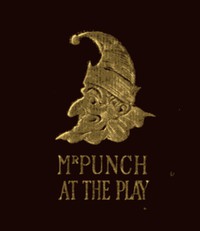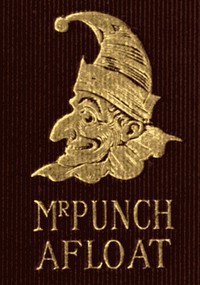Mr. Punch at the Play: Humours of Music and the Drama by Hammerton and Keene (have you read this book TXT) 📗

- Author: Hammerton and Keene
Book online «Mr. Punch at the Play: Humours of Music and the Drama by Hammerton and Keene (have you read this book TXT) 📗». Author Hammerton and Keene
Stage Man. Of course I will. Capital idea. (Marks prompt-book.) I wonder who that chap is in the wing?
Splitter. Haven't the faintest idea. Looks like an undertaker. Hallo, Wobbler, brought your new song?
Wobbler. Yes, it ought to go. And I've a gross or so of capital wheezes.[Pg 56]
Splitter. No poaching, old chap.
Wobbler. Of course not. I'll not let them off when you're on. Morning, Miss Skid. Perfect, I suppose?
Miss Skid (brightly). I'm always "perfect." But—(seriously)—I had to cut all the idiotic stuff in my part, and get Peter Quip of "The Kangaroo" to put in something up to date. Here's the boss!
[Enter Mr. Footlyte, the manager, amid a chorus of salutations.Stage Man. Places, ladies and gentlemen.
Mr. Footlyte. Before we begin the rehearsal, I would point out that I have completely rewritten the second act, and——
The Stranger in the Ulster. But, sir, I beg of you to remember——
Mr. F. Who is that man?
Everybody. We don't know!
Mr. F. (advancing). Who are you, sir, who dare to trespass on my premises?
The S. in the U. Don't you remember me, Mr. Footlyte?
Mr. F. No, sir, I do not. What's your business?[Pg 57]
The S. in the U. (nervously). I am the author of the piece.
Everybody. Ha! ha! ha!
Mr. F. Then you're not wanted here. (To stage manager.) Jenkins, clear the stage.
[The author is shown out. Rehearsal proceeds. Curtain.Meant as a Compliment.—Shakspeare Smith (to Miss Lagushe, after production of his new comedy). And what did you think of my little piece the other night?
Miss Lagushe. I didn't pay the least attention to the play. All I thought was, what a cruel ordeal the performance must be for you!
NEO-DRAMATIC NURSERY RHYMEMrs. Grundy, good woman, scarce knew what to think
About the relation 'twixt drama and drink.
Well, give hall—and theatre—good wholesome diet,
And all who attend will be sober and quiet!
[Pg 55]
Younger Son of Ducal House. "Mother, allow me to introduce to you—my wife."
His Wife (late of the Frivolity Theatre). "How do, Duchess? I'm the latest thing in m�salliances!"
[Pg 58]
HINTS TO AMATEUR PLAYWRIGHTS.Of the Essence of Drama.—It is not strictly necessary that you should know much about this, but as a rough indication it may be stated that whenever two or more persons stand (or sit) upon a platform and talk, and other persons, whether from motives of ennui, or charity, or malice, or for copyright purposes only, go and listen to them, the law says it is a stage-play. It does not follow that anybody else will.
Of the Divers Sorts of Dramatic Writing.—Owing to the competition nowadays of the variety entertainment you will do well to treat these as practically amalgamated. For example, start Act I. with an entirely farcical and impossible marriage, consequent upon a mistake similar to that of "Mr. Pickwick" about the exact locality of his room; drop into poetry and pathos in Act II. (waltz-music "off" throughout will show that it is poetry and pathos); introduce for the first time in Act III. a melodramatic villain, who endeavours to[Pg 59] elope with the heroine (already married, as above, and preternaturally conscious of it), and wind-up Act IV. with a skirt dance and a general display of high spirits, with which the audience, seeing that the conclusion is at hand, will probably sympathise. Another mixture, very popular with serious people, may be manufactured by raising the curtain to a hymn tune upon a number of obviously early Christians, and, after thus edifying your audience, cheering them up again with glimpses of attractive young ladies dressed (to a moderate extent) as pagans, and continually in fits of laughter. The performance of this kind of composition is usually accompanied by earthquakes, thunder and lightning; but the stage carpenter will attend to these.
Of Humour.—Much may be accomplished in this line by giving your characters names that are easily punned upon. Do not forget, however, that even higher flights of wit than you can attain by this means will be surpassed by the simple expedient of withdrawing a chair from behind a gentleman about to sit down upon it. And this only requires a stage-direction.
Of Dialogue.—Speeches of more than half a page,[Pg 60] though useful for clearing up obscurities, are generally deficient in the qualities of repartee. After exclaiming, "Oh, I am slain!" or words to that effect, no character should be given a soliloquy taking more than five minutes in recitation.
Of the Censorship.—This need not be feared unless you are unduly serious. Lady Godiva, for instance, will be all right for a ball where the dress is left to the fancy, but you must not envelop her in problems.
Motto for the Stage-Worshippers.—"Mummer's the word!"
[Pg 61]
Gushing Young Woman (to famous actor). "Oh, do you know, Mr. Starleigh, I'm simply mad to go on the stage!" Famous Actor. "Yes, I should think you would be, my dear young lady!"
[Pg 62]
THE DECLINE OF THE DRAMAMundungus deems the drama is declining,
Yet fain would swell the crowded playwright ranks.
The secret of his pessimist opining,
Is—all his dramas are declined—with thanks!
CONTRIBUTION TOWARDS NURSERY RHYMES (For Use of Infant Students in New School of Dramatic Art)'Tis the voice of the prompter,
I hear him quite plain;
He has prompted me twice,
Let him prompt me again.
[Pg 63]
A suggestion to the refreshment departments of our theatres, much simpler than the old method of struggling by, and would prevent the men going out between the acts.
First night of musical comedy. The authors called before the curtain.
Jones (arriving in the middle of the overture to "Tristan und Isolde"—quite audibly). "Well, thank goodness we're in plenty of time!"
[Pg 64]
Appropriate Shakspearian Motto for A Firm of Advertising Agents.—"Posters of the sea and land."
Quid pro Quo.—Actor-Manager (to Dramatic Author). What I want is a one-part piece.
Dramatic Author. That's very easily arranged. You be number one, and "part" to me.
[Pg 65]
Araminta. Why, dearest, do you call those witticisms, which the comedians deliver with such ready humour, "gags"?
Corydon (the playwright). Because they always stifle the author.
[Smiles no more during the evening.The Mummer's B�te-noire.--"Benefits forgot."
[Pg 66]
Sangazur, Senior. "Look here, what's all this nonsense I hear about your wanting to marry an actress?"
Sangazur, Junior. "It's quite true, sir. But—er—you can have no conception how very poorly she acts!"
[Pg 67]
Box-Office Keeper at the Imperial Music-Hall (to Farmer Murphy, who is in town for the Islington Horse Show). "Box or two stalls, sir?" Murphy. "What the dev'l d'ye mane? D'ye take me an' the missus for a pair o' proize 'osses? Oi'll have two sates in the dhress circle, and let 'em be as dhressy as possible, moind!"
[Pg 68]
"Nervous? oh dear no! I only acted once in private theatricals, Mr. Jones, and, although it was an important part, I had nothing to say!" "Really? What was the part?" "Can't you guess?"
[Pg 69]
Jennings and Bellamy, the famous dramatists, planning one of those thrilling plays of plot and passion, in which (as everybody knows) Jennings provides the inimitable broad humour, and Bellamy the love-scenes and the tragic deaths. (Bellamy is the shorter of the two.)
[Pg 70]
WHY I DON'T WRITE PLAYS (From the Common-place Book of a Novelist)Because it is so much pleasanter to read one's work than to hear it on the stage.
Because publishers are far more amiable to deal with than actor-managers.
Because "behind the scenes" is such a disappointing place—except in novels.
Because why waste three weeks on writing a play, when it takes only three years to compose a novel?
Because critics who send articles to magazines inviting one to contribute to the stage, have no right to dictate to us.
Because a fairly successful novel means five hundred pounds, and a fairly successful play yields as many thousands—why be influenced by mercenary motives?
Because all novelists hire their pens in advance for years, and have no time left for outside labour.
And last, and (perhaps) not least, Why don't I send in a play? Because I have tried to write one, and find I can't quite manage it!
[Pg 71]
Mamma (who has taken Miss Effie, as a great treat, to a morning performance). "Hush, dear! You mustn't talk!"
Miss Effie (with clear sense of injustice, and pointing to the stage). "But, mummy,—they're talking!"
[Pg 72]
Q. When are the affairs of a theatre likely to assume a somewhat fishy aspect? A. When there's a sole lessee.
Evangeline. Why is this called the dress circle, mamma?
Mamma. Because the stalls are the undressed circle, dear.
A Form of Equestrian Drama.—Horseplay.
[Pg 73]
He. "Are we alone?" Voice from the Gallery. "No, guv'nor; but you will be to-morrow night."
[Pg 74]
Our Bandmaster (to purveyor of refreshments). "We must hev beef sangwitches, marm! Them ham ones make the men's lips that greasy, they can't blow!"
[Pg 75]
Wife (given to literature and the drama). "George, what is the meaning of the expression, 'Go to!' you meet with so often in Shakspeare and the old dramatists?"
Husband (not a reading man). "'Don't know, I'm sure, dear, unless—— Well,—p'raps he was going to say—— but thought it wouldn't sound proper!"
[Pg 76]
[Pg 77]
Wife of his Bosom (just home from the play). "And then that darling Walter Lisson, looking like a Greek god, drew his stiletto, and delivered, oh! such an exquisite soliloquy over her tomb—all in blank verse—like heavenly music on the organ!"
He. "Why, he's got a voice like a raven, and can no more deliver blank verse than he can fly."
She. "Ah, well—it was very beautiful, all the same—all about love and death, you know!"
He. "Who wrote the piece, then?"
She. "Who wrote the piece? Oh—er—well—his name's sure to be on the bill somewhere—at least I suppose it is!"
[Pg 78]
From our General Theatrical Fund.—Why would a good-natured dramatic critic be a valuable specimen in an anatomical museum? Because he takes to pieces easily.
MEM. BY A MANAGERTo say "boo" to a goose requires some doing.
In theatres 'tis the goose who does the "booing,"
And though a man may do the best he can, sir,
Anser will hiss, though hissing may not answer!
REVISED VERSION OF SHAKSPEARE"A Poor player,
Who struts and frets his hour on the stage,
And then—goes in society."
[Pg 79]
Rupert the





Comments (0)